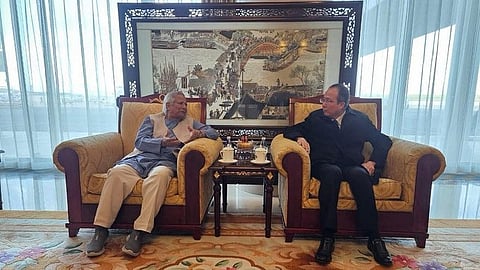

NEW DELHI: Amid an evolving economic partnership, China has committed USD 2.1 billion in loans, investments, and grants to Bangladesh, with the Teesta River Comprehensive Management and Restoration Project (TRCMRP) standing as a focal point in the bilateral relationship.
During the ongoing visit of Bangladesh’s Chief Adviser Prof. Muhammad Yunus to Beijing, both countries discussed China’s potential involvement in the ambitious project aimed at managing the Teesta River. The river, which flows through both Bangladesh and India, is of critical importance for water resources and agricultural irrigation, making the project highly strategic as well.
The Teesta project, which envisions building a large reservoir, deepening the riverbed, constructing embankment roads, and developing satellite cities along its banks, has stirred regional tensions, particularly with India. While China expressed its readiness to assist Bangladesh with financing and expertise, India raised concerns over Chinese involvement in the project.
Beijing’s participation could be seen as an extension of its influence in South Asia, and particularly in Bangladesh, where China is already heavily invested in infrastructure projects. Former Prime Minister Sheikh Hasina was very sensitive to Indian concerns.
Despite these concerns, Bangladesh has shown an interest in securing Chinese support.
Yunus urged Chinese firms to invest in the Teesta project. The Bangladesh government had previously sought a loan of USD 725 million from China but has faced delays due to the project’s financial viability.
China, however, has expressed cautious optimism, noting that while the project is still in its conceptual phase, it could be developed in stages with Chinese involvement.
Prime Minister Sheikh Hasina, during her visit to India in June 2024, emphasised that while Bangladesh appreciated China’s readiness to participate, she would prefer India to take the lead on the project, signaling the delicate balancing act Dhaka faces between its two powerful neighborurs.
Beyond the Teesta project, the visit to China also highlighted growing economic collaboration between the two countries. China has committed significant investments aimed at bolstering Bangladesh’s infrastructure, trade, and industrial capacities. In addition to discussions on the Teesta project, China pledged USD 400 million for the modernisation of the Mongla Port, which is a critical gateway for Bangladesh’s international trade. The port modernisation will boost Bangladesh’s logistical capabilities and enhance its export potential.
China will also invest USD 350 million into developing a China Industrial Economic Zone in Bangladesh. This project aims to attract Chinese manufacturing companies to relocate operations to Bangladesh, positioning the country as an emerging manufacturing hub in South Asia. Ashik Chowdhury, Executive Chairman of Bangladesh’s Investment Development Authority, said that these investments are crucial to diversifying Bangladesh’s economy and reducing its reliance on a few sectors. Yunus also encouraged Chinese businesses to explore opportunities in textiles, pharmaceuticals, and renewable energy—sectors seen as vital to Bangladesh’s future growth.
In addition to these investments, China has committed USD 150 million in technical assistance for various sectors in Bangladesh, reinforcing its role as a major economic partner in the region. This financial commitment is part of a broader strategy by China to deepen ties with Bangladesh and promote infrastructure and industrial development across the country.
A significant aspect of the discussions between Bangladesh and China was the focus on hydrological cooperation. Both countries signed an agreement to exchange hydrological information related to the Yarlung Zangbo-Jamuna River, which flows through both nations. This initiative aims to improve flood management and enhance disaster prevention mechanisms, critical for Bangladesh, which frequently faces flooding and other climate-related challenges.
China has also shown interest in exploring hydroelectric projects along the Yarlung Zangbo, known as the Brahmaputra in India and Jamuna in Bangladesh. These projects, however, have raised concerns in India, which fears that Chinese control over water resources in the region could impact downstream water flow.